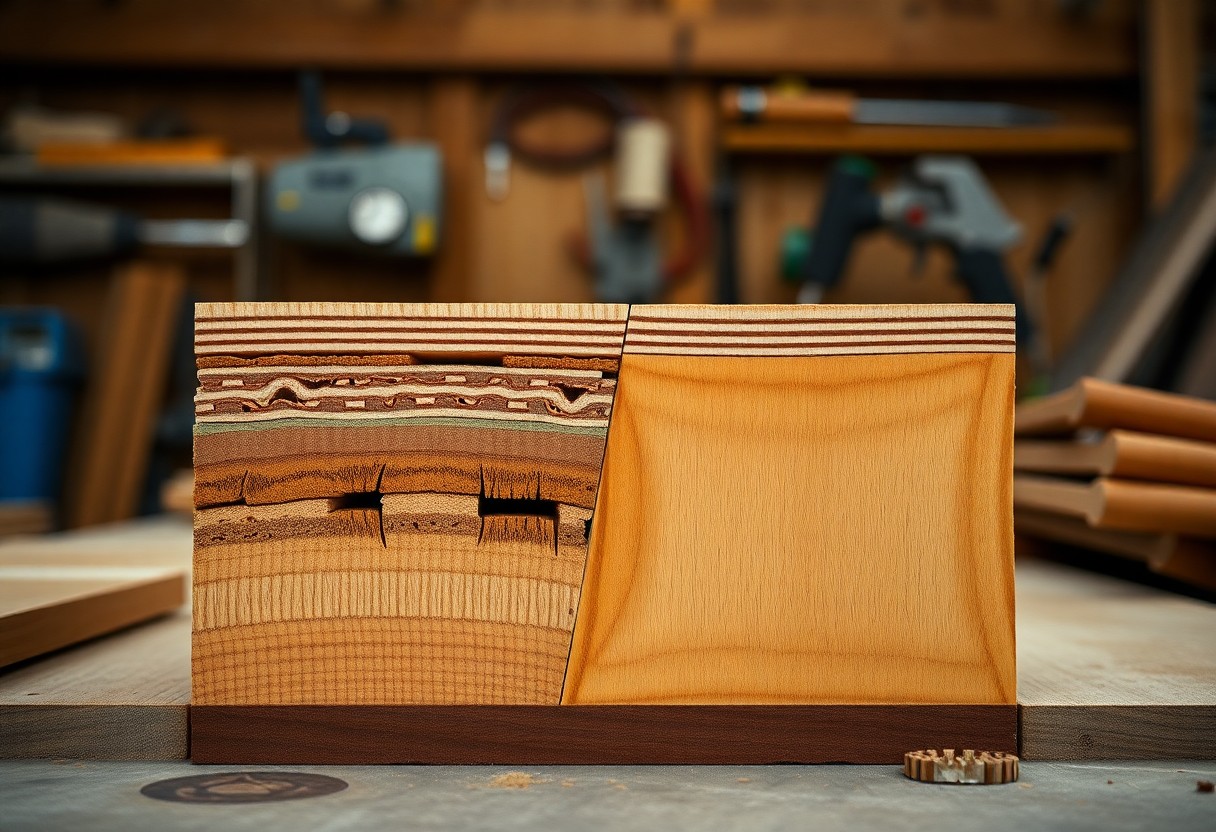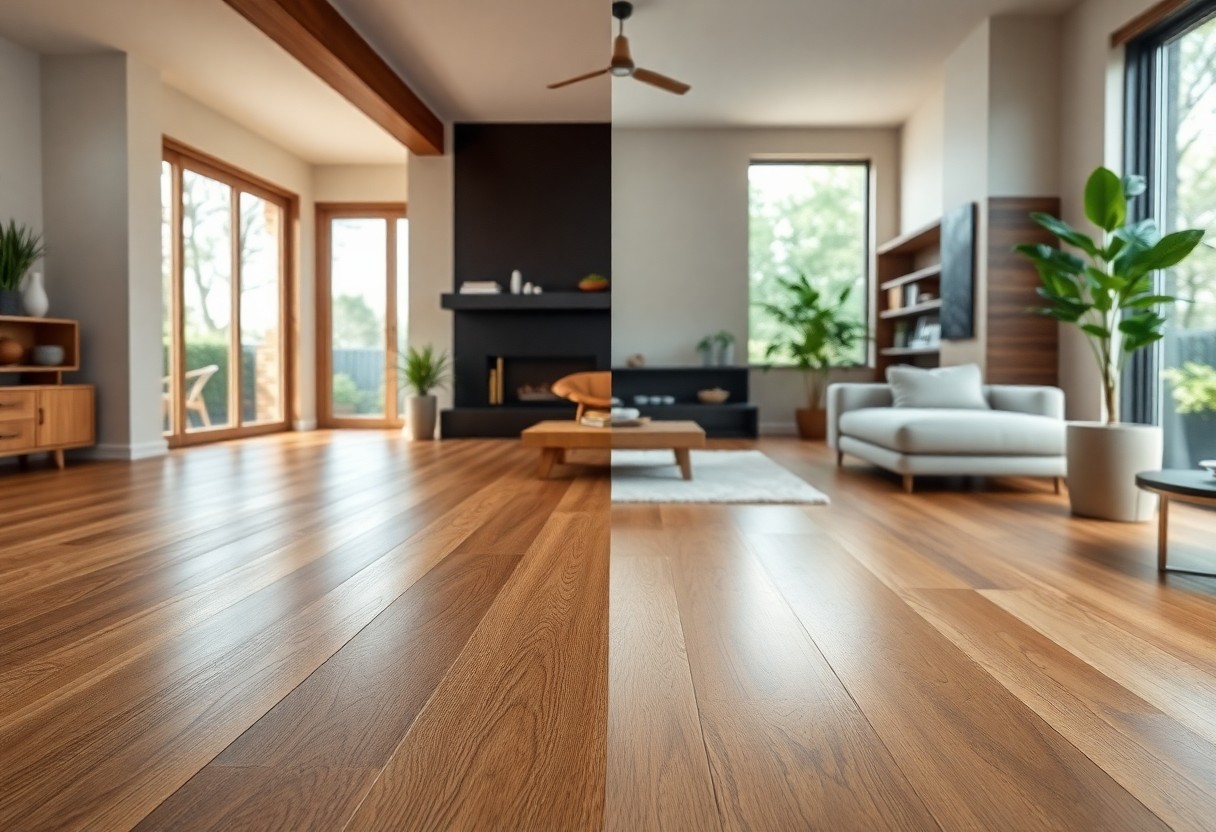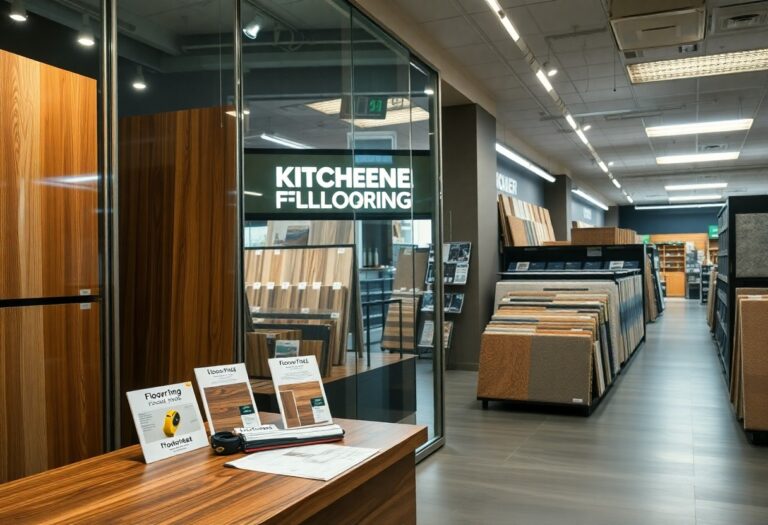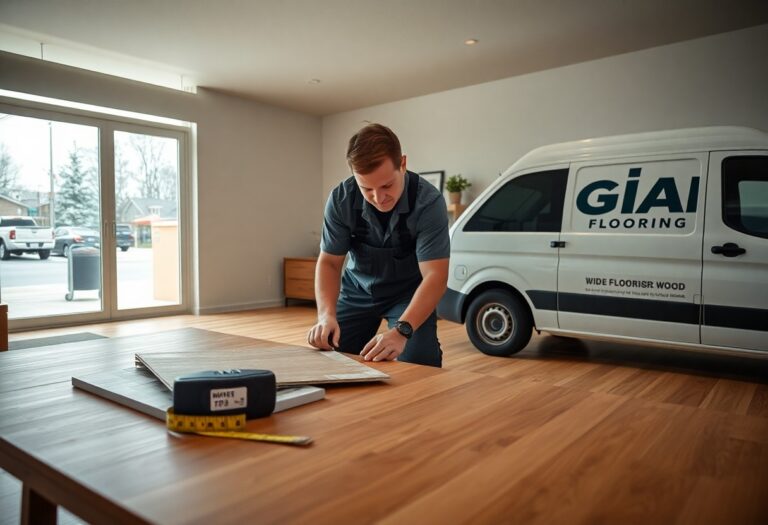Flooring decisions can significantly impact your home’s aesthetics and functionality, so understanding the differences between engineered flooring and solid hardwood is necessary. Both options offer unique advantages tailored to various lifestyles and preferences. This guide will help you evaluate the benefits and drawbacks of each, allowing you to make an informed choice that aligns with your needs and enhances your living space.
Overview of Engineered Flooring
Engineered flooring combines natural hardwood with advanced technology, making it a versatile choice for various environments. Unlike solid hardwood, which is crafted from a single piece of wood, engineered flooring features multiple layers of materials that enhance stability and resistance to moisture, making it suitable for basements and areas prone to humidity.
Composition and Construction
This type of flooring typically consists of a top layer of hardwood veneer, which provides the authentic wood appearance, bonded to multiple layers of plywood or high-density fiberboard below. This layered construction not only offers durability but also reduces the risks of warping and expansion that solid hardwood often faces.
Benefits of Engineered Flooring
One significant advantage of engineered flooring is its ability to adapt to varying climates, fitting seamlessly into homes with different humidity levels. Additionally, it can be installed over a variety of surfaces, including concrete, reducing installation costs. Its rich aesthetic, similar to solid hardwood, provides an upscale look without the challenges of maintenance associated with solid wood.
Engineered flooring also boasts impressive acoustics and thermal insulation, making it comfortable underfoot while reducing noise. Its easy maintenance makes it suitable for busy households, and the array of styles available allows you to match your personal décor. With proper care, engineered flooring can last for decades, offering a great balance between beauty and practicality.
Overview of Solid Hardwood
Solid hardwood flooring is crafted from a single piece of natural wood, renowned for its durability and timeless appeal. It is a long-lasting choice that can enhance the aesthetic of any space. When properly maintained, solid hardwood can last for generations, making it a worthy investment for homeowners seeking elegance and value.
Characteristics and Types
Solid hardwood comes in various species, each offering unique colors and grain patterns. You can choose from oak, maple, cherry, and walnut, among others. Additionally, thicknesses typically range from 3/4 inch to 5/16 inch. Characteristics influencing your choice include:
- Grain patterns
- Color variations
- Moisture resistance
- Hardness ratings
- Finish options
Knowing the specific features of each type can help you make an informed decision that suits your home’s style and climate.
| Type of Wood | Characteristics |
| Oak | Strong, durable, with a prominent grain |
| Maple | Light color, smooth texture, and degree of hardness |
| Cherry | Rich color, darkens with age, resilient |
| Walnut | Luxurious dark tones, soft to medium hardness |
Advantages of Solid Hardwood
One major benefit of solid hardwood is its longevity, which can exceed 100 years with appropriate care. The ability to refinish it multiple times without losing integrity allows for flexibility in design choices over time. Solid hardwood also enhances the resale value of your home, appealing to prospective buyers who value high-quality materials.
Moreover, solid hardwood floors can help improve indoor air quality by not harboring dust or allergens. This makes them a healthier choice for your living environment. Additionally, their aesthetic appeal adds warmth and character, creating a welcoming atmosphere in any room. When you choose solid hardwood, you not only opt for a beautiful surface but also invest in a product that stands the test of time and trends.

Comparison of Durability
| Aspect | Solid Hardwood | Engineered Flooring |
|---|---|---|
| Moisture Resistance | Low | High |
| Wear Resistance | Moderate | High |
| Refinishing Ability | Yes | Limited |
Resistance to Moisture and Humidity
Engineered flooring excels in environments with varying moisture levels, thanks to its layered construction that reduces the risk of warping. In contrast, solid hardwood is more susceptible to humidity fluctuations, leading to potential swelling and shrinkage over time. If your space experiences high humidity, engineered flooring is often the better choice.
Wear and Tear Over Time
Solid hardwood can endure extensive wear but typically requires occasional refinishing to maintain its appearance, especially in high-traffic areas. Engineered flooring, with its tougher veneer, is designed to withstand more significant daily wear. This makes engineered options a favorable investment if you anticipate heavy foot traffic.
Considering a busy household or commercial space? Engineered flooring’s ability to resist scratches and dents often makes it more appealing. Additionally, its surface technology can include protective finishes that enhance durability and ease cleaning. On the other hand, while solid hardwood can be refinished to refresh its appearance, the process can be time-consuming and costly, making engineered flooring a practical solution for those prioritizing convenience alongside longevity.
Aesthetic Considerations
Your choice between engineered flooring and solid hardwood will significantly impact the look and feel of your space. The natural beauty of wood grain adds warmth, while the surface texture can enhance the overall design. Additionally, both options offer an array of finishes that can cater to various aesthetic preferences, from rustic to contemporary. Choosing the right type depends on aligning it with your existing decor and personal style.
Design Options and Styles
You have a wealth of design options with both engineered flooring and solid hardwood. Engineered flooring often comes in a wider range of colors and textures, allowing for more versatility in your interior design. Solid hardwood, while limited in variations, provides that classic, timeless look that many homeowners desire. Both types offer various plank sizes and widths, enabling you to achieve your ideal aesthetic.
Finishing and Refinishing Potential
Your flooring’s finishing and refinishing capabilities influence its long-term appeal and maintenance. Solid hardwood can be sanded and refinished multiple times, allowing you to change its look over the years easily. In contrast, engineered flooring may have a limited refinishing potential, typically requiring specialized products and procedures.
Your choice in flooring can influence not just the aesthetics but also the practicality of installation and maintenance. While engineered flooring typically allows for quicker and simpler installation options such as click-lock systems, solid hardwood may require professional installation, especially for nail-down methods. Considering your DIY capabilities and timeline can help you decide which flooring type is more suitable for your home environment.
Installation Processes
Long-Term Care and Upkeep
Cost Analysis
Your budget will play a significant role in the decision between engineered flooring and solid hardwood. While both options offer unique benefits, understanding their costs can help you make the best choice for your lifestyle and financial situation.
Initial Investment
The initial investment for solid hardwood flooring tends to be higher, typically ranging from $5 to $10 per square foot, compared to engineered flooring, which usually falls between $3 to $7 per square foot. Labor costs may also vary, but solid hardwood often requires skilled installers to ensure optimal results, potentially increasing your upfront expenses.
Long-Term Value
Choosing the right flooring option can impact your return on investment over time. Solid hardwood floors can last for decades, often increasing your home’s resale value, while engineered flooring may not provide the same long-lasting benefits but offers affordability and versatility.
Solid hardwood floors often increase in value, especially in markets where homebuyers prioritize premium flooring options. With proper maintenance, such as refinishing every few years, they can last well over 100 years. In contrast, engineered flooring, while less expensive initially, may require more frequent replacement, diminishing its long-term financial appeal. If you plan to stay in your home for many years, investing in solid hardwood can yield greater returns when it’s time to sell.
Summing up
Summing up, when choosing between engineered flooring and solid hardwood, you need to consider your lifestyle and preferences. If you value stability and moisture resistance, especially in variable climates, engineered flooring may be your ideal choice. However, if you prioritize traditional aesthetics and long-term durability, solid hardwood could serve you better. Assess factors like installation, maintenance, and budget to determine which option aligns with your needs and enhances your living space effectively.





